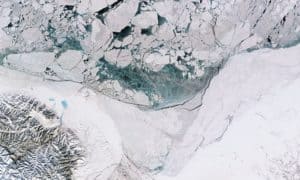Wednesday, November 21st, 2018
GEORGINA GUSTIN, Reporter - Inside Climate News
Stephan: There is a life-affirming alternative to chemical-industrial monoculture agriculture and forestry, and it has huge positive implications.

A new study assesses the potential of U.S. forests, farms and other landscapes to store carbon and help offset a large part of the country’s greenhouse gas emissions.
Credit: Andrew Lichtenstein/Corbis/ Getty
Conserving and restoring American forest, farm and natural lands could cut a substantial chunk of the country’s emissions, helping meet greenhouse gas reduction goals without relying on undeveloped technologies, a new report finds.
A team of 38 researchers spent more than two years looking at “natural climate solutions”—a range of strategies that includes planting trees in cities, preventing the conversion of natural grassland to farmland and shifting to fertilizers that produce less greenhouse gas emissions.
In a study published Wednesday in Science Advances, they report that these solutions, if deployed across agricultural lands, forests, grasslands and wetlands, could mitigate 21 percent of the country’s net annual greenhouse gas emissions, getting the U.S. closer to meetings its goals under the Paris climate agreement.
“It’s the same as if every car and truck in the country stopped polluting the climate,” said Joseph Fargione, the study’s lead author and, the […]
No Comments
Tuesday, November 20th, 2018
C.J. Polychroniou, - truthout
Stephan: I am leading today's edition of SR with this essay for two reasons. First, I am beginning to see a trend in which capitalism as a system is being called into question in a way it has not been in some decades. I take this as an early symptom of coming social unrest. Second, because this line of argument makes the same mistakes earlier alternatives like the thinking of Marx, and Engels made. Why? Because the alternatives presented are still expressions of a worldview based on materialism.
Democracy is the best social organization system, in my opinion, because it is the one that most closely reflects the nonlocal consciousness domain and the formation of the collective intention that creates the illusion we call reality. So how do we deal with capitalism? It actually isn't that complicated, I think. It gets down to social values. A society that makes fostering wellbeing its first priority can use capitalism and its encouragement of innovation and entrepreneurship so long as profit is always subordinate to wellbeing from the individual, to the family, the community, the state, the nation, and the planet itself. How do we do that? By exercising the power of the quotidian choice. I describe it in detail in
The 8 Laws of Change.
It may seem too simple to be true, but this is how Gandhi got independence for India without a war, and Martin Luther King created the civil rights movement.
Climate change is the greatest existential crisis facing humanity today. Capitalist industrialization has led us to the edge of the precipice, and avoiding the end of civilization as we know it may require the development of a view in direct opposition to the way in which capitalism “values” nature, according to John Bellamy Foster, professor of sociology at the University of Oregon and editor of the socialist magazine Monthly Review.
C. J. Polychroniou: We live in a period of massive environmental disturbance, such that it has led to the claim that we are no longer in the Holocene epoch but instead in the midst of the Anthropocene era. Assuming that this claim, popularized in the West by the atmospheric chemist and Nobel laureate Paul Crutzen, is scientifically correct, to what extent can economic growth itself be blamed for the catastrophic effects of human activities on the environment, including influencing the climate by burning fossil fuels, cutting down rainforests and farming livestock?
John Bellamy Foster: It is worth noting that the Anthropocene concept originated in the early USSR. It first appeared in the English language in the translation of The Great Soviet Encyclopedia in the 1970s. This arose out of discussions of anthropogenic change and the biosphere […]
2 Comments
Tuesday, November 20th, 2018
Anthony W. Orlando, - Washington Post
Stephan: With appropriate academic cautions this is an excellent assessment of the failure of Trumpian Republican economics, and once again what do we see? We see further proof that Republicans cannot govern because policies that have only profit as their first priority are always inferior. Foolish people who vote for them are voting to degrade their lives. Each of us, as voters, must always support only those things that foster wellbeing if we want to recover our country.

Credit: Jim Watson/AFP/Getty
Two years have passed since Donald Trump made his famous campaign promise in disaffected regions across the country: “We are going to start winning again!” For many voters who felt that they had lost ground in recent decades, the candidate argued, a vote for him would be rewarded with renewed prosperity and prominence.
It was a classic campaign promise, overly ambitious and cleverly vague. What exactly did “winning” mean? Certainly, many reporters believed voters perceived the promise as an economic one. So let’s measure the promise’s success that way. How have Trump voters fared economically, compared with Hillary Clinton voters?
Not noticeably better, according to the data. By most measures, my latest research shows, Trump counties — and especially counties with higher proportions of Trump voters — continue to fall farther behind the rest of the country economically. The story of our economy, like the story of our politics, continues to be a story of division and divergence.
Trump’s America vs. Clinton’s America
It is no secret that the country […]
1 Comment
Tuesday, November 20th, 2018
Drew MacFarlane, - Weather.com
Stephan: Recently I did an article showing that human activity is literally dissolving the seafloor. And now this. We are destroying the meta-systems of the planet by our stupidity and greed. Only a new democratic value system fostering wellbeing, one that recognizes that all life is interconnected and interdependent will save human civilization. I think it is really becoming that clear-cut.

The seafloor
Credit: tomisl.z/Depositphotos
Three times more ocean water than originally thought is being swallowed by the Earth as the planet’s tectonic plates sink below one another, a new study discovered.
Published in the journal Nature, a team of researchers took an estimate of how much water is being sucked into the Earth’s interior through subduction zones — where two continental plates meet and one is being drawn downward.
Researchers used data recorded by seismographs along the Mariana Trench — a subduction zone where the Pacific Plate is subducted beneath the Philippine Plate — to analyze a year’s worth of measurements that enabled them to draw a better picture of just how much water the rocks inside the plates could hold. The determination was made by recording the speed at which seismic waves travel through the rocks.
(MORE: U.S. Town Won’t See Sun Again Until Jan. 23)
Near the Mariana Trench, at least 4.3 times more ocean water is subducted than previously thought.
This discovery bodes large in understanding the Earth’s deep water cycle, said Columbia University’s Donna Shillington. […]
3 Comments
Tuesday, November 20th, 2018
Oliver Milman , - Guardian (U.K.)
Stephan: The Trump administration against all scientific counsel, and driven on by the greed of Hilcorp Energy, authorized oil drilling in the Arctic. In a great irony, past stupidity has now sabotaged present stupidity.

Trump approved the go-ahead of the Liberty project to extract oil from beneath the Beaufort Sea.
Credit: Nasa
Plans to establish the first oil drilling operation in US Arctic waters have hit an ironic snag – a lack of sea ice caused by rapid warming in the region.
Last month, the Trump administration approved the go-ahead of the Liberty project to extract oil from beneath the Beaufort Sea, off Alaska’s north coast. The drilling would be the first of its kind in federal waters in the Arctic and follows Trump’s reversal of an Obama-era ban on fossil fuel activity in the polar region.
But in order to get to the oil, Hilcorp Energy, the Texas-based company behind the project, has to construct a temporary gravel island about five miles offshore so it can drill in shallow water.
This nine-acre structure requires an expanse of landfast sea ice, or ice that forms each winter and attaches to the coast, which would then be covered in gravel and then concrete. However, […]
No Comments














